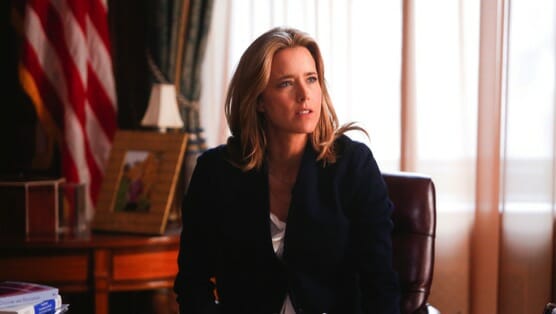Madam Secretary: “Pilot”
(Episode 1.01)

Pilots are problematic, and the reasons for this are legion. They’re often produced all by their lonesome, far in advance of airdate and sometimes they even recast key roles. They’re also rarely emblematic of the upcoming series as a whole. The cast, show runner and writers have barely gotten their feet wet and, as a result, pilots are often not good examples of the overall quality of a series. For example, last season The 100 had a terrible pilot episode, but strengthened by leaps and bounds, thereafter. Sometimes it takes even longer—and even occasionally requires characters to grow beards.
But I digress. The point is, most shows need some time to settle in, and it’s by this yardstick that I judge virtually every new show, rarely quitting after one episode. This is the case with the well-done—but for the moment lightweight—Madam Secretary.
Tea Leoni is Elizabeth McCord, a former CIA operative turned University of Virginia professor, who lives an idyllic life on a Virginia horse farm with her husband Henry, a professor of religion (Tim Daly), and her two teenaged children Jason (Evan Roe) and Allison (Kathrine Herzer). A third, older child arrives in episode two. The witty banter starts immediately, and Leoni is appealing and believable as one of a pair of hyper-intelligent professors in a loving marriage. It feels a bit too Norman Rockwell/Frank Capra for the 21st century, but then again, we’re only three minutes into the pilot.
Wait, did I forget to mention that two American teens have been arrested and imprisoned in Syria? My bad.
Yes, like many shows, this one has an extended cold open (a trend of which I am not in favor) and this one contains not one, not two, but three separate plot elements. An argument can be made that this sort of table-setting is needed in a pilot, but I’m not so sure.
At any rate, while at a dinner with former CIA colleagues in DC (which is 120 miles from UVA if you’re counting, and the first of many rather liberal twists on reality taken by the show) Elizabeth’s three active CIA pals all receive a text at the same time “Well, this can’t be good,” she says, and it’s not. Turns out the Secretary of State’s plane has gone down off the coast of Florida, thus establishing our premise.
The next day, while mucking out the stalls, Elizabeth is called by the office of the president while POTUS’ motorcade is speeding up her driveway. President Conrad Dalton (Keith Carradine) has come (120 miles!) to ask her to be the new Secretary of State in person. Cue the third unlikely happening in the first six minutes, but at least this one is dramatically necessary.
-

-

-

-

-

-

-

-

-

-

-

-

-

-

-

-

-

-

-

-

-

-

-

-

-

-

-

-

-

-

-

-

-

-

-

-

-

-

-

-








































